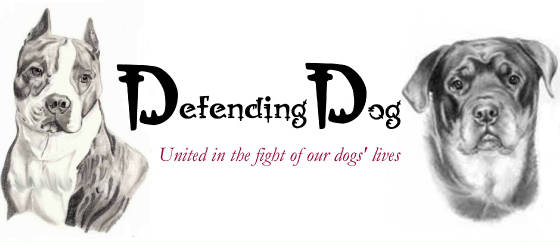In light of the seemingly constant news of pit bull bans, including the extremely controversial and heartbreaking Denver and Ontario bans, it would seem to many of us that breed discrimination is a new horror. Unfortunately, it is and has been a worldwide epidemic for quite some time. Several countries enforce breed bans or other forms of breed restrictions – and those restrictions are not only limited to pit bulls. Germany, Italy, Australia, Denmark, Canada, and many others all enforce some form of breed discrimination.
It’s Not Just Pit Bulls
If you think breed discrimination won’t affect you because you aren’t a pit bull owner, think again. Owners of Rottweilers, Dobermans, Huskys, Akitas and others are already feeling the effects of BSL. Even harder to believe, Italy enforces restrictions against such breeds as collies, corgies, miniature schnauzers, St. Bernards and miniature pinschers! In fact, there are over 90 breeds banned or restricted in Italy… NINETY!!!!
Commonly Targeted Breeds
- Pit Bull Type Dogs
- Rottweilers
- Doberman Pinschers
- German Shepherds
- Mastiffs
- Akitas
- Chow Chows
- Bullmastiffs
- Wolf hybrids
Surprisingly Restricted Breeds (Italy)
- Collies
- Corgis
- Miniature Schnauzers
- St. Bernards
- Miniature Pinschers
- Australian Shepherds
- Dalmatians
- Many More…
The Growing Problem
The trend in breed-specific legislation is alarming. What often begins as restrictions against “fighting breeds” like pit bulls quickly expands to include more and more breeds as officials realize the fundamental flaw in their approach: dog bites continue regardless of which breeds are banned.
This expansion of BSL to include more breeds over time demonstrates the ineffectiveness of the approach. Rather than addressing the root causes of dog aggression and bite incidents, lawmakers simply add more breeds to the list, punishing responsible owners and their well-behaved dogs without improving public safety.
Why BSL Spreads
What’s the reason for this worldwide epidemic? Simple… laws that enforce breed discrimination (BSL) don’t work primarily because they don’t target the true problem of irresponsible ownership. When dog attacks continue, as they undoubtedly will, another condemned breed is added to the list.
This cycle continues because:
- BSL creates the illusion of action without addressing the real issue
- Many lawmakers lack knowledge about dog behavior and bite prevention
- Media coverage sensationalizes dog attacks by certain breeds
- Once one community passes BSL, neighboring communities often follow
- The public perceives dramatic action as effective action
What You Can Do
- Be a RESPONSIBLE dog owner! Properly train and socialize your dog.
- Contact law makers when breed specific laws are proposed. Don’t wait for someone else to speak up – by that time, it may be too late.
- Help implement bite prevention programs in your community – especially those targeting children – as it is inevitable that some people will continue to be irresponsible and careless with their dogs.
- Join a group specific to fighting breed specific legislation. The support and encouragement received are priceless and, working together, we just may put a stop to breed discrimination!
Our virtual candlelight vigil for the innocent victims of ignorance and discrimination.
May the flame burn until the hate is gone…
In Memory…
To date, the Denver pit bull ban, enacted on May 9, 2005, has taken the lives of over 1,020 innocent pit bulls. May God bless their precious souls.
“Precious in the sight of the Lord is
the death of His meek ones.”
Psalm 116:15
Understanding the Domino Effect
Breed-specific legislation follows a predictable pattern that threatens all dog owners:
- Initial Targeting: First, “fighting breeds” like pit bulls are banned.
- Continued Incidents: Dog bites continue because the real issue (irresponsible ownership) isn’t addressed.
- Expansion of Bans: Additional breeds like Rottweilers and German Shepherds are added to the list.
- Further Failures: Bite statistics remain unchanged or shift to non-restricted breeds.
- More Restrictions: More breeds are added, including those previously considered “family friendly.”
This pattern has already played out in countries like Italy, where what began as restrictions on a handful of “dangerous breeds” has expanded to affect nearly 100 different breeds and types of dogs.
The message is clear: Today it’s pit bulls. Tomorrow it could be your breed. The only way to protect all dogs is to fight against BSL and advocate for breed-neutral dangerous dog laws that target irresponsible owners instead of innocent dogs.
